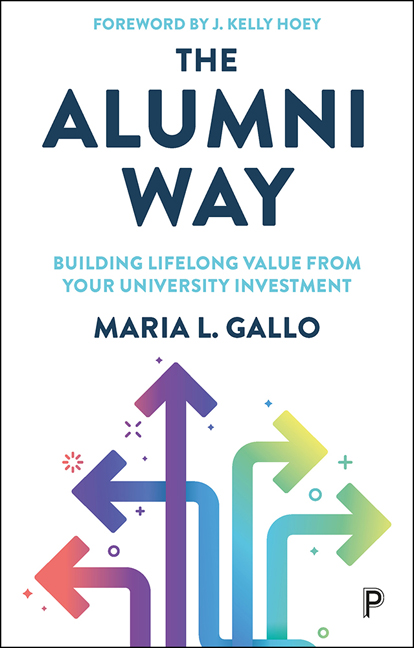Book contents
- Frontmatter
- Dedication
- Contents
- Acknowledgements
- Foreword
- Introduction: We are all alumni
- PART I Charting the course of the Alumni Way
- PART II The Alumni Way trait: Reflection
- PART III The Alumni Way trait: Curiosity
- PART IV The Alumni Way trait: Passion
- PART V The Alumni Way trait: Generosity
- PART VI Alumni: Bringing it into our lives
- Notes
- References
- About the author
- Index
18 - Generosity signpost: Understand the power of giving
Published online by Cambridge University Press: 13 May 2022
- Frontmatter
- Dedication
- Contents
- Acknowledgements
- Foreword
- Introduction: We are all alumni
- PART I Charting the course of the Alumni Way
- PART II The Alumni Way trait: Reflection
- PART III The Alumni Way trait: Curiosity
- PART IV The Alumni Way trait: Passion
- PART V The Alumni Way trait: Generosity
- PART VI Alumni: Bringing it into our lives
- Notes
- References
- About the author
- Index
Summary
One of the biggest challenges in presenting a book with broad appeal is the cultural differences in financial giving to the university. Experiences of alumni donations vary by country and size of institution. Other factors also affect financial giving, such as if the university is publicly or privately funded, tuition paid by students (if any), debt at graduation (if any), or even if the word ‘alumni’ is commonly used at all. One common thread transcends all of this: funding dominates the discussions, policies, and decision making across higher education. From the debates on who pays for higher education, to diversifying income streams, regardless of the system or funding structure, money is on the agenda. Alumni, enter stage left.
The alumni and philanthropy are intertwined, especially alumni financial donations to their alma mater. So much so that it's ubiquitous. ‘Most universities maintain a fairly active alumni network,’ writes David Burkus in his bestselling book on networking, Friend of a Friend. Burkus continued his point with the explanation: ‘(they see it as a source of future donations)’. Burkus is saying what many of us are thinking: universities are engaging with us, as alumni, ultimately to solicit a donation from us in the future. The add-on ‘T’ – ties – to the common time, talent, and treasure definition of philanthropy, is not far behind. Alumni also give from their personal or professional network. The main beneficiary becomes our alma mater or fellow alumni. With an overall theme of generosity, we will examine treasure and ties from a slightly radical perspective.
Have fundraising campaigns taken over our campuses? There are banners, brochures, and social media posts promoting the impact that private donations have on the university. The messages of ‘giving back’ or ‘being part of the campaign’ invite us to join the crusade of advancing the institution. Behind the scenes, these calls are the strategic collaboration of many university departments, including communications, marketing, alumni relations, and development (fundraising). We can decide to be generous in a multitude of ways that encompass our time and talent discussed earlier, or our treasure and ties. This is one of many powerful positions we find ourselves in as alumni.
- Type
- Chapter
- Information
- The Alumni WayBuilding Lifelong Value from your University Investment, pp. 151 - 168Publisher: Bristol University PressPrint publication year: 2021

